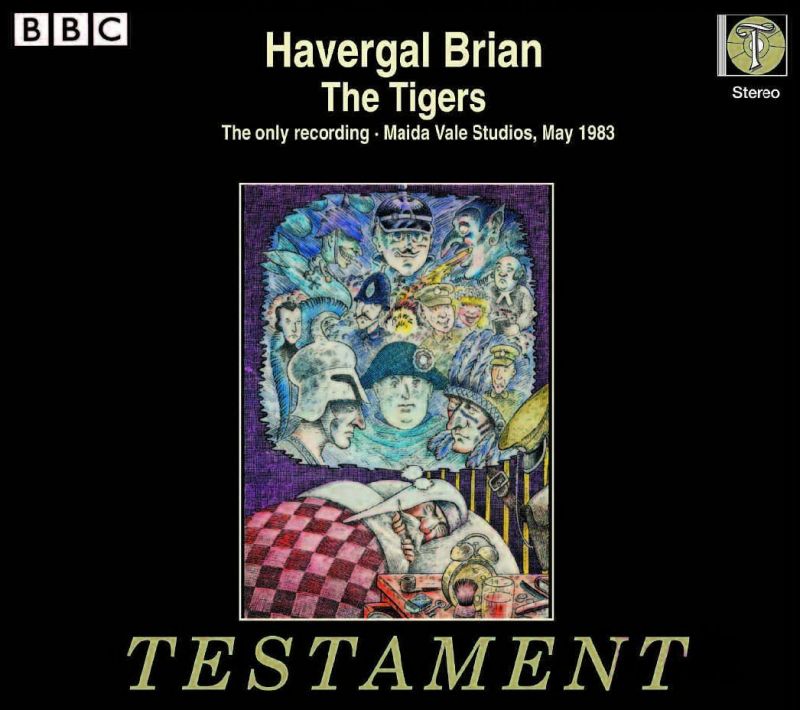BRIAN The Tigers
View record and artist detailsRecord and Artist Details
Composer or Director: Havergal Brian
Genre:
Opera
Label: Testament
Magazine Review Date: 04/2015
Media Format: CD or Download
Media Runtime: 161
Mastering:
DDD
Catalogue Number: SBT3 1496

Tracks:
| Composition | Artist Credit |
|---|---|
| (The) Tigers |
Havergal Brian, Composer
Alan Opie, Baritone Alan Watt, Bass-baritone Alison Hargan, Soprano Ameral Gunson, Mezzo soprano Anne-Marie Owens, Contralto (Female alto) BBC Singers BBC Symphony Orchestra Dennis Wicks, Bass Eric Shilling, Bass Harry Nicholl, Tenor Havergal Brian, Composer Henry Herford, Bass Ian Caddy, Baritone John Dudley, Countertenor John Winfield, Tenor Kenneth Woollam, Baritone Lionel Friend, Conductor Malcolm Donnelly, Bass Marilyn Hill Smith, Soprano Michael Bundy, Bass-baritone Norman Welsby, Baritone Paul Crook, Tenor Richard Angas, Baritone Teresa Cahill, Soprano |
Author: Guy Rickards
If Spike Milligan had written the libretto in 1916, it could scarcely have been more absurd or surreal than the one Brian himself devised. The action plunges straight into the riotous Prologue (as would Busoni’s near-contemporaneous Doktor Faust) set on Hampstead Heath that is over twice as long as the official first act. The Prologue features a huge array of characters, none of whom recur in the main body of the opera; during it nothing of larger consequence occurs, except the posting of a notice announcing the declaration of war. The restrained second scene’s main elements do recur later – an assignation between two lovers (here Pantalon and Columbine) and officious policemen. But only in the brief first act, in many respects a delayed prelude to the main part of the opera, are the principal characters unveiled, not least the Tigers themselves, a regiment of great ancestry and tradition. Act 2 centres around a mock battle between the Tigers and another regiment, the Hornets, which descends into farce when the Tigers decide to make hay with the local farm girls instead. Act 3 hinges on a garbled message muddling birthdays, Zeppelins and blackouts – and the cooks’ prank in the local church bell tower. Acts 2 and 3 are prefaced by dream sequences: in Act 2 for the Tigers’ redoubtable colonel, Sir John Stout (sung with wonderful pomposity by Malcolm Donnelly); but that in Act 3 totally alters the plane on which the opera takes place. Local policemen, slumbering on duty, dream two dark, fantastical visions – the symphonic dances ‘Gargoyles’ and ‘Lacryma’ – lifting the veil on the horrors of war and setting the comic elements in stark contrast. Along the way, Sir John becomes enamoured of the flirtatious Mrs Pamela Freebody (deliciously sung by Teresa Cahill) and it is they, after all the various mix-ups have been resolved, who close the opera as the embodiment of perhaps the work’s main message: make love, not war.
The BBC’s performance, made with some of the finest British singers of the day, still sounds bright and vivid. Lionel Friend – who conducted a number of Brian’s works around this time – had the measure of this coruscating, multilayered and stylistically diverse score, and the BBC Symphony Orchestra’s virtuosity still astounds. Testament’s transfer is brilliant and bright, catching the music’s many facets with remarkable clarity and faithfulness. What the work needs now is a staging. What an event that would be.
Discover the world's largest classical music catalogue with Presto Music.

Gramophone Digital Club
- Digital Edition
- Digital Archive
- Reviews Database
- Full website access
From £8.75 / month
Subscribe
Gramophone Full Club
- Print Edition
- Digital Edition
- Digital Archive
- Reviews Database
- Full website access
From £11.00 / month
Subscribe
If you are a library, university or other organisation that would be interested in an institutional subscription to Gramophone please click here for further information.




